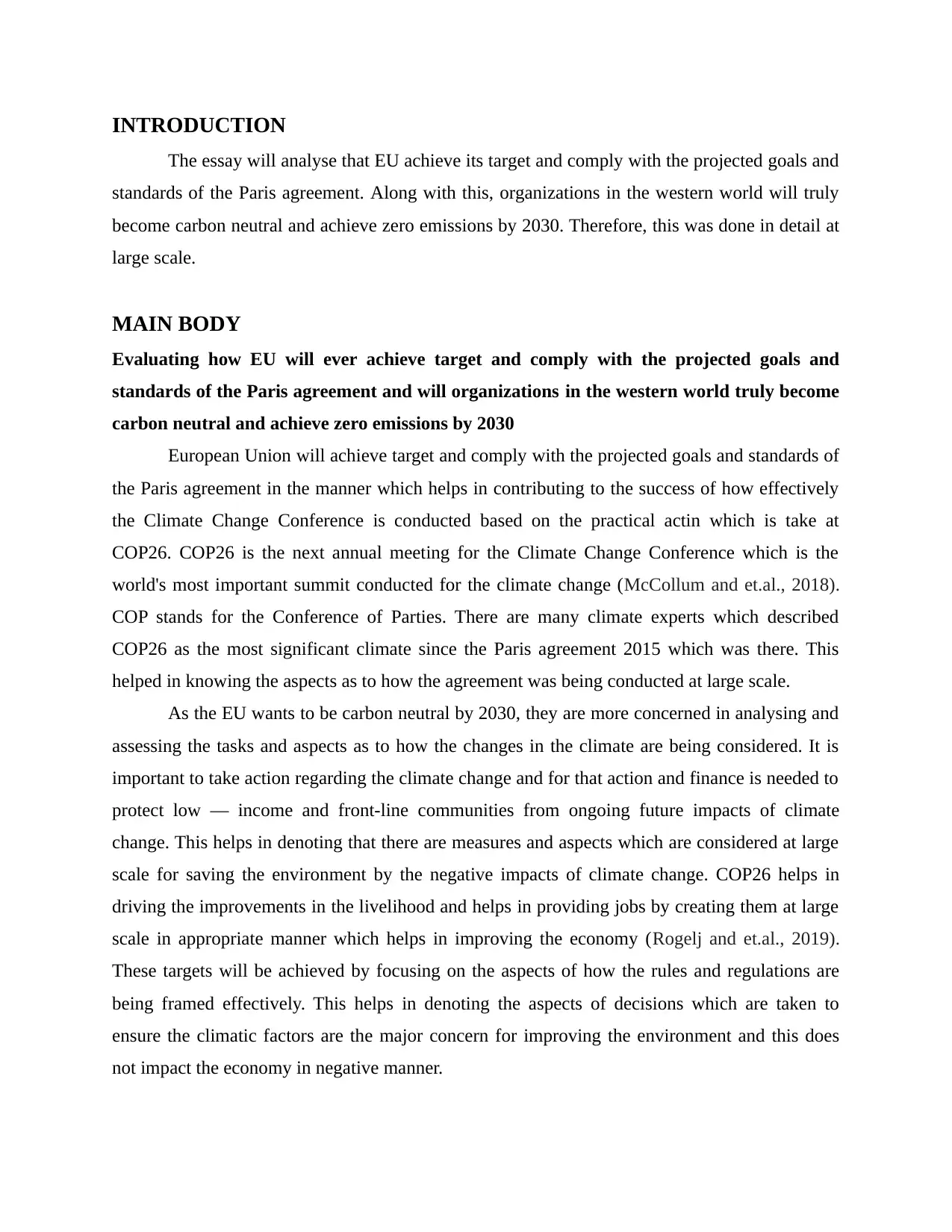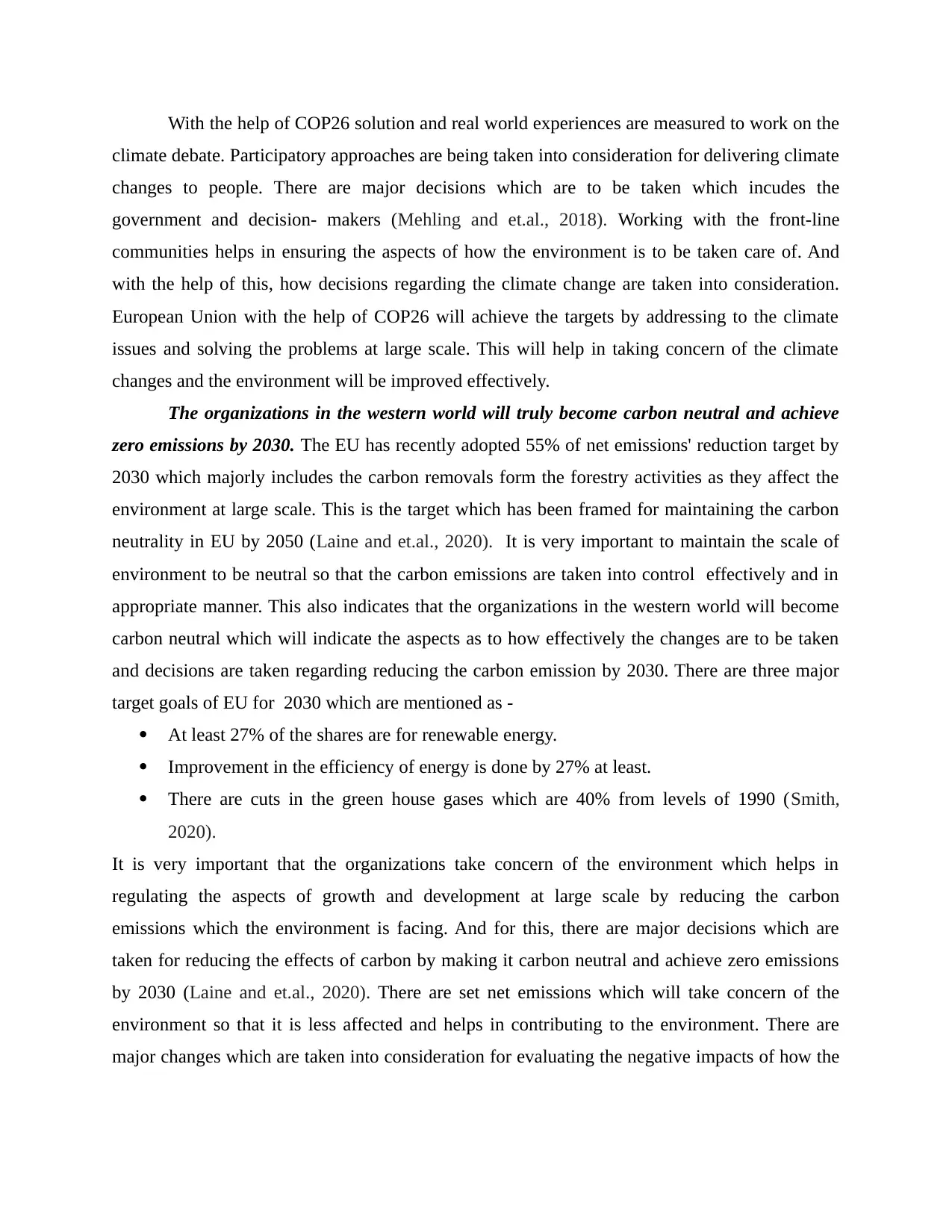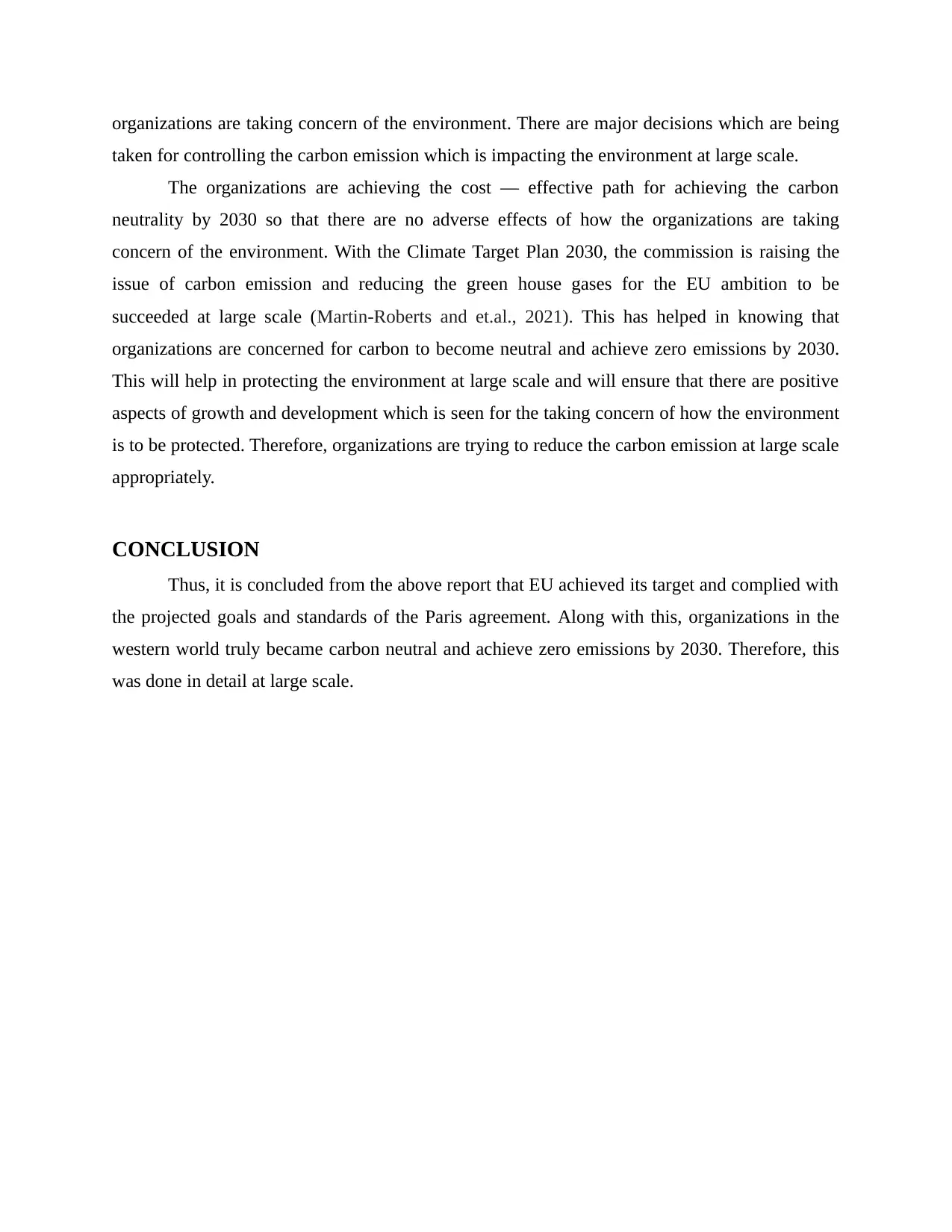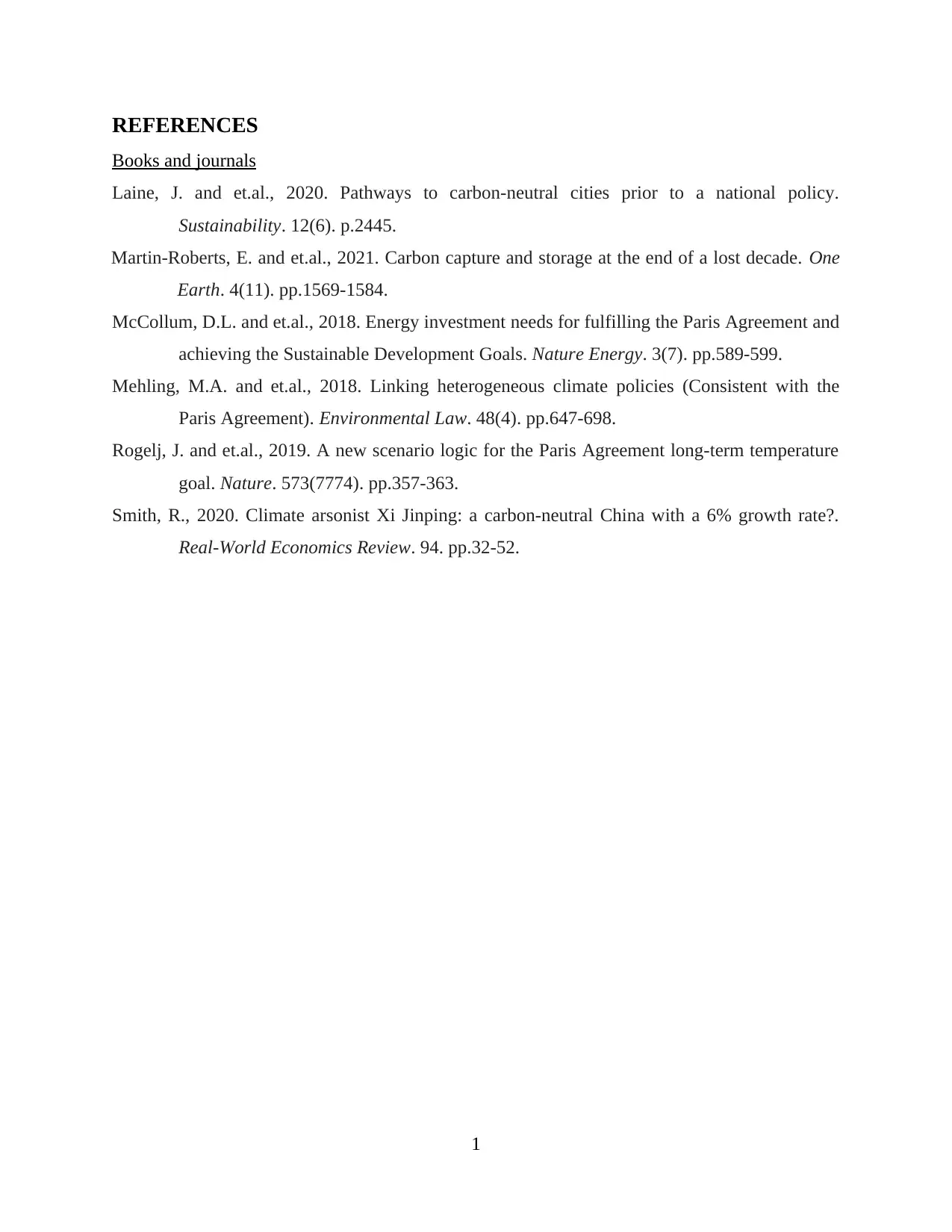LSC/UoS - Carbon Neutrality: EU, Paris Agreement & COP26 - Report
VerifiedAdded on 2023/06/14
|6
|1315
|430
Report
AI Summary
This report assesses the European Union's progress towards achieving its carbon neutrality targets and compliance with the Paris Agreement, particularly in light of the COP26 conference. It evaluates the EU's commitment to becoming carbon neutral by 2030 and explores how organizations in the western world are working towards zero emissions. The report highlights the significance of COP26 in shaping climate action and discusses the EU's strategies, including setting emission reduction targets, promoting renewable energy, and improving energy efficiency. It also emphasizes the role of organizations in reducing carbon emissions and contributing to a sustainable environment, ultimately concluding that the EU is on track to meet its goals and comply with international standards for carbon neutrality.

Individual Report
Paraphrase This Document
Need a fresh take? Get an instant paraphrase of this document with our AI Paraphraser

Table of Contents
INTRODUCTION...........................................................................................................................3
MAIN BODY...................................................................................................................................3
CONCLUSION................................................................................................................................7
REFERENCES................................................................................................................................1
INTRODUCTION...........................................................................................................................3
MAIN BODY...................................................................................................................................3
CONCLUSION................................................................................................................................7
REFERENCES................................................................................................................................1

INTRODUCTION
The essay will analyse that EU achieve its target and comply with the projected goals and
standards of the Paris agreement. Along with this, organizations in the western world will truly
become carbon neutral and achieve zero emissions by 2030. Therefore, this was done in detail at
large scale.
MAIN BODY
Evaluating how EU will ever achieve target and comply with the projected goals and
standards of the Paris agreement and will organizations in the western world truly become
carbon neutral and achieve zero emissions by 2030
European Union will achieve target and comply with the projected goals and standards of
the Paris agreement in the manner which helps in contributing to the success of how effectively
the Climate Change Conference is conducted based on the practical actin which is take at
COP26. COP26 is the next annual meeting for the Climate Change Conference which is the
world's most important summit conducted for the climate change (McCollum and et.al., 2018).
COP stands for the Conference of Parties. There are many climate experts which described
COP26 as the most significant climate since the Paris agreement 2015 which was there. This
helped in knowing the aspects as to how the agreement was being conducted at large scale.
As the EU wants to be carbon neutral by 2030, they are more concerned in analysing and
assessing the tasks and aspects as to how the changes in the climate are being considered. It is
important to take action regarding the climate change and for that action and finance is needed to
protect low — income and front-line communities from ongoing future impacts of climate
change. This helps in denoting that there are measures and aspects which are considered at large
scale for saving the environment by the negative impacts of climate change. COP26 helps in
driving the improvements in the livelihood and helps in providing jobs by creating them at large
scale in appropriate manner which helps in improving the economy (Rogelj and et.al., 2019).
These targets will be achieved by focusing on the aspects of how the rules and regulations are
being framed effectively. This helps in denoting the aspects of decisions which are taken to
ensure the climatic factors are the major concern for improving the environment and this does
not impact the economy in negative manner.
The essay will analyse that EU achieve its target and comply with the projected goals and
standards of the Paris agreement. Along with this, organizations in the western world will truly
become carbon neutral and achieve zero emissions by 2030. Therefore, this was done in detail at
large scale.
MAIN BODY
Evaluating how EU will ever achieve target and comply with the projected goals and
standards of the Paris agreement and will organizations in the western world truly become
carbon neutral and achieve zero emissions by 2030
European Union will achieve target and comply with the projected goals and standards of
the Paris agreement in the manner which helps in contributing to the success of how effectively
the Climate Change Conference is conducted based on the practical actin which is take at
COP26. COP26 is the next annual meeting for the Climate Change Conference which is the
world's most important summit conducted for the climate change (McCollum and et.al., 2018).
COP stands for the Conference of Parties. There are many climate experts which described
COP26 as the most significant climate since the Paris agreement 2015 which was there. This
helped in knowing the aspects as to how the agreement was being conducted at large scale.
As the EU wants to be carbon neutral by 2030, they are more concerned in analysing and
assessing the tasks and aspects as to how the changes in the climate are being considered. It is
important to take action regarding the climate change and for that action and finance is needed to
protect low — income and front-line communities from ongoing future impacts of climate
change. This helps in denoting that there are measures and aspects which are considered at large
scale for saving the environment by the negative impacts of climate change. COP26 helps in
driving the improvements in the livelihood and helps in providing jobs by creating them at large
scale in appropriate manner which helps in improving the economy (Rogelj and et.al., 2019).
These targets will be achieved by focusing on the aspects of how the rules and regulations are
being framed effectively. This helps in denoting the aspects of decisions which are taken to
ensure the climatic factors are the major concern for improving the environment and this does
not impact the economy in negative manner.
⊘ This is a preview!⊘
Do you want full access?
Subscribe today to unlock all pages.

Trusted by 1+ million students worldwide

With the help of COP26 solution and real world experiences are measured to work on the
climate debate. Participatory approaches are being taken into consideration for delivering climate
changes to people. There are major decisions which are to be taken which incudes the
government and decision- makers (Mehling and et.al., 2018). Working with the front-line
communities helps in ensuring the aspects of how the environment is to be taken care of. And
with the help of this, how decisions regarding the climate change are taken into consideration.
European Union with the help of COP26 will achieve the targets by addressing to the climate
issues and solving the problems at large scale. This will help in taking concern of the climate
changes and the environment will be improved effectively.
The organizations in the western world will truly become carbon neutral and achieve
zero emissions by 2030. The EU has recently adopted 55% of net emissions' reduction target by
2030 which majorly includes the carbon removals form the forestry activities as they affect the
environment at large scale. This is the target which has been framed for maintaining the carbon
neutrality in EU by 2050 (Laine and et.al., 2020). It is very important to maintain the scale of
environment to be neutral so that the carbon emissions are taken into control effectively and in
appropriate manner. This also indicates that the organizations in the western world will become
carbon neutral which will indicate the aspects as to how effectively the changes are to be taken
and decisions are taken regarding reducing the carbon emission by 2030. There are three major
target goals of EU for 2030 which are mentioned as -
At least 27% of the shares are for renewable energy.
Improvement in the efficiency of energy is done by 27% at least.
There are cuts in the green house gases which are 40% from levels of 1990 (Smith,
2020).
It is very important that the organizations take concern of the environment which helps in
regulating the aspects of growth and development at large scale by reducing the carbon
emissions which the environment is facing. And for this, there are major decisions which are
taken for reducing the effects of carbon by making it carbon neutral and achieve zero emissions
by 2030 (Laine and et.al., 2020). There are set net emissions which will take concern of the
environment so that it is less affected and helps in contributing to the environment. There are
major changes which are taken into consideration for evaluating the negative impacts of how the
climate debate. Participatory approaches are being taken into consideration for delivering climate
changes to people. There are major decisions which are to be taken which incudes the
government and decision- makers (Mehling and et.al., 2018). Working with the front-line
communities helps in ensuring the aspects of how the environment is to be taken care of. And
with the help of this, how decisions regarding the climate change are taken into consideration.
European Union with the help of COP26 will achieve the targets by addressing to the climate
issues and solving the problems at large scale. This will help in taking concern of the climate
changes and the environment will be improved effectively.
The organizations in the western world will truly become carbon neutral and achieve
zero emissions by 2030. The EU has recently adopted 55% of net emissions' reduction target by
2030 which majorly includes the carbon removals form the forestry activities as they affect the
environment at large scale. This is the target which has been framed for maintaining the carbon
neutrality in EU by 2050 (Laine and et.al., 2020). It is very important to maintain the scale of
environment to be neutral so that the carbon emissions are taken into control effectively and in
appropriate manner. This also indicates that the organizations in the western world will become
carbon neutral which will indicate the aspects as to how effectively the changes are to be taken
and decisions are taken regarding reducing the carbon emission by 2030. There are three major
target goals of EU for 2030 which are mentioned as -
At least 27% of the shares are for renewable energy.
Improvement in the efficiency of energy is done by 27% at least.
There are cuts in the green house gases which are 40% from levels of 1990 (Smith,
2020).
It is very important that the organizations take concern of the environment which helps in
regulating the aspects of growth and development at large scale by reducing the carbon
emissions which the environment is facing. And for this, there are major decisions which are
taken for reducing the effects of carbon by making it carbon neutral and achieve zero emissions
by 2030 (Laine and et.al., 2020). There are set net emissions which will take concern of the
environment so that it is less affected and helps in contributing to the environment. There are
major changes which are taken into consideration for evaluating the negative impacts of how the
Paraphrase This Document
Need a fresh take? Get an instant paraphrase of this document with our AI Paraphraser

organizations are taking concern of the environment. There are major decisions which are being
taken for controlling the carbon emission which is impacting the environment at large scale.
The organizations are achieving the cost — effective path for achieving the carbon
neutrality by 2030 so that there are no adverse effects of how the organizations are taking
concern of the environment. With the Climate Target Plan 2030, the commission is raising the
issue of carbon emission and reducing the green house gases for the EU ambition to be
succeeded at large scale (Martin-Roberts and et.al., 2021). This has helped in knowing that
organizations are concerned for carbon to become neutral and achieve zero emissions by 2030.
This will help in protecting the environment at large scale and will ensure that there are positive
aspects of growth and development which is seen for the taking concern of how the environment
is to be protected. Therefore, organizations are trying to reduce the carbon emission at large scale
appropriately.
CONCLUSION
Thus, it is concluded from the above report that EU achieved its target and complied with
the projected goals and standards of the Paris agreement. Along with this, organizations in the
western world truly became carbon neutral and achieve zero emissions by 2030. Therefore, this
was done in detail at large scale.
taken for controlling the carbon emission which is impacting the environment at large scale.
The organizations are achieving the cost — effective path for achieving the carbon
neutrality by 2030 so that there are no adverse effects of how the organizations are taking
concern of the environment. With the Climate Target Plan 2030, the commission is raising the
issue of carbon emission and reducing the green house gases for the EU ambition to be
succeeded at large scale (Martin-Roberts and et.al., 2021). This has helped in knowing that
organizations are concerned for carbon to become neutral and achieve zero emissions by 2030.
This will help in protecting the environment at large scale and will ensure that there are positive
aspects of growth and development which is seen for the taking concern of how the environment
is to be protected. Therefore, organizations are trying to reduce the carbon emission at large scale
appropriately.
CONCLUSION
Thus, it is concluded from the above report that EU achieved its target and complied with
the projected goals and standards of the Paris agreement. Along with this, organizations in the
western world truly became carbon neutral and achieve zero emissions by 2030. Therefore, this
was done in detail at large scale.

REFERENCES
Books and journals
Laine, J. and et.al., 2020. Pathways to carbon-neutral cities prior to a national policy.
Sustainability. 12(6). p.2445.
Martin-Roberts, E. and et.al., 2021. Carbon capture and storage at the end of a lost decade. One
Earth. 4(11). pp.1569-1584.
McCollum, D.L. and et.al., 2018. Energy investment needs for fulfilling the Paris Agreement and
achieving the Sustainable Development Goals. Nature Energy. 3(7). pp.589-599.
Mehling, M.A. and et.al., 2018. Linking heterogeneous climate policies (Consistent with the
Paris Agreement). Environmental Law. 48(4). pp.647-698.
Rogelj, J. and et.al., 2019. A new scenario logic for the Paris Agreement long-term temperature
goal. Nature. 573(7774). pp.357-363.
Smith, R., 2020. Climate arsonist Xi Jinping: a carbon-neutral China with a 6% growth rate?.
Real-World Economics Review. 94. pp.32-52.
1
Books and journals
Laine, J. and et.al., 2020. Pathways to carbon-neutral cities prior to a national policy.
Sustainability. 12(6). p.2445.
Martin-Roberts, E. and et.al., 2021. Carbon capture and storage at the end of a lost decade. One
Earth. 4(11). pp.1569-1584.
McCollum, D.L. and et.al., 2018. Energy investment needs for fulfilling the Paris Agreement and
achieving the Sustainable Development Goals. Nature Energy. 3(7). pp.589-599.
Mehling, M.A. and et.al., 2018. Linking heterogeneous climate policies (Consistent with the
Paris Agreement). Environmental Law. 48(4). pp.647-698.
Rogelj, J. and et.al., 2019. A new scenario logic for the Paris Agreement long-term temperature
goal. Nature. 573(7774). pp.357-363.
Smith, R., 2020. Climate arsonist Xi Jinping: a carbon-neutral China with a 6% growth rate?.
Real-World Economics Review. 94. pp.32-52.
1
⊘ This is a preview!⊘
Do you want full access?
Subscribe today to unlock all pages.

Trusted by 1+ million students worldwide
1 out of 6
Related Documents
Your All-in-One AI-Powered Toolkit for Academic Success.
+13062052269
info@desklib.com
Available 24*7 on WhatsApp / Email
![[object Object]](/_next/static/media/star-bottom.7253800d.svg)
Unlock your academic potential
Copyright © 2020–2026 A2Z Services. All Rights Reserved. Developed and managed by ZUCOL.



